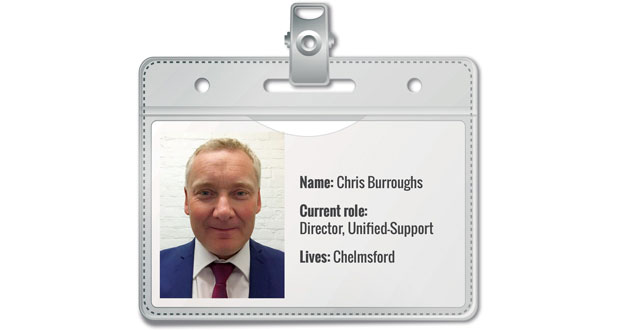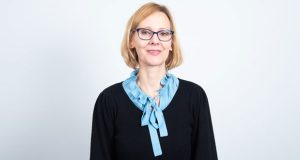Q: What first attracted you to working in FM, did you have much awareness of the profession?
I’ve always enjoyed ‘making the show happen’, this has modified over the years to ‘making the show happen and the clients happy’ through to ‘making the show happen, the clients happy and ensuring the technology works. To be honest I did not have much awareness of the profession other than the safety aspect.
Q: How did you progress through the profession to your current role?
I wanted to experience the sights and sounds of London and took a job in Central Government providing Audio Visual equipment, service, and support across 30+ buildings in central London. I learned a lot about supply, demand, resource management and customer service – plus how to make aging kit work well and adopting new technologies to meet the needs of the end users. From here I transferred to a Video Production Unit travelling the world in support of UK Trade and Industry. I went to some interesting places meeting great people along the way and further explored all elements of ‘making the show happen’. Fortunately, I found time to study Photography, Electronics, Video Production and Management which set me up for the future. After eleven years on the Civil Service payroll I could see little future for extreme specialists such as I and took a job with a Global Advertising Agency in central London working in their internal TV Production unit. I came across a huge variation in equipment, from the very old through to the latest and greatest, working amongst very diverse colleagues, clients, and some famous people along the way, very different from the civil service. I played a part in the agencies move from their location of 40 plus years to a new modern HQ, devising new systems, relocating useful equipment, and disposing of the obsolete, a lesson in ‘making the show happen’ ready for day one of opening. From there I moved to a small engineering firm setting up an office in Canary Wharf which led to building a support, service, and maintenance business initially from three to more than 50. I travelled the world, onboarding teams, providing service to a wide client base in diverse sectors such as banking, legal, finance, entertainment, management consulting and pharmaceutical to name a few, ‘making the show happen’. Following acquisition of the business by a larger rival, I made the decision to adapt or move on, I did the former, making the best of both worlds as we grew the service, team, and delivery for 18 years in total, learning a lot around sales, contract management, resourcing and in particular people with a global team of 160 plus diverse specialists. I then moved on to a smaller organisation that had recently turned its focus to maintenance and developed numerous client focused offerings, getting under the skin of how the end users ‘make the show happen’, understanding and hopefully delivering what they required and what they had not realised they required! At the back of my mind I always hankered working for myself and looked back fondly on the small company mentality of versatility, fast turnaround, and no pigeonholes! ‘Making the show happen quickly, doing it well and having fun’, here we are today.
Q: What have you found the most challenging experiences working in FM?
You need to understand what your customers and what their customers want. Are you meeting everyone’s needs, is anything missing? I find myself regularly working for IT or FM departments both of which can be detached from the end user.
Q: What have you found most satisfying about working in the sector?
The great feeling you get when something has been successfully delivered, be it a fix, a form of service or new technology.
Q: What qualities do you think are most needed for a successful career in FM?
Understanding, engagement, tenacity, and the ability to have thought about the unknown. Move with the times and be at the forefront of change.
Q: What has changed about your job role since the COVID-19 crisis? E.g. home working, furloughed, redeployed?
It has been a challenge for sure, let us look at the positives, technology has been around for a long time to aid communication on many platforms and if deployed properly makes major changes to the office, there has never been such a need to deploy, adopt or adapt. Organisations with hybrid workforces need to channel thought into employee’s wellbeing and how to get the best out of their staff ensuring a collaborative and empathetic culture.
Q: What is your organisation doing to ensure the wellbeing of staff – whether working at home or returning to the workplace?
The door (or communication platform) is always open. We always listen and help our colleagues on work or a personal level showing empathy, care, and consideration, making change as required to help. Be prepared to listen, help, and make the time. The watercooler may not be accessible anymore, but we all have many tools that allow us to speak to each other.
Q: Do you believe the pandemic has highlighted the important role of the FM sector and what areas do you see as most key?
Absolutely, the workplace must change, and support is always required. End users need a reason to come to the office so let us make it work for them and be something special, safe, and secure. Access should be smooth, everything in place, without delays and let us put some pleasing distractions in place.
Q: What advice would you give to someone coming into the profession now?
Learn as much as you can, get recognised accreditations, join professional bodies, and get the most out of your membership. Look at what your peers in other organisations provide. Gain an understanding of the location you admire and strive to make yours match or be even better. Tap into knowledge out in the field and most importantly understand your customers.
Q: Which of your achievements are you most proud of during your career?
Remaining grounded, I would not ask somebody to do something I would not be prepared to do myself. I also enjoyed setting up a service division within an organisation in New York, recruiting and setting on the staff, putting process and procedure in place and then the hands on delivering the service whilst getting an understanding of different cultures.
Q: What do you predict could be the main changes to the FM sector post pandemic?
I suspect we will see more last-minute change. Many organisations are still to go back to their offices and are unsure of how it will work and what is needed to make this happen. I feel there will be further change when the new way of working has bedded in with facilities needing to adapt. I also see changes within workforces, with the aid of technology do we need the same levels and type of manpower? We should look to simplification and adoption to make things happen and give our clients, customers, and end users a friendly, smarter experience.





